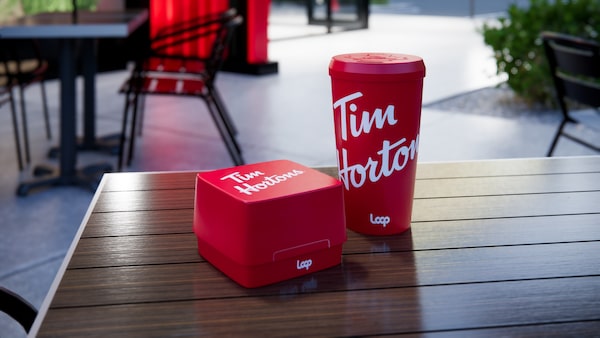
Rendering of packaging that would give Tim Hortons customers the option to pay a deposit to have orders filled in reusable cups and other packaging.Supplied
Coffee-and-doughnuts chain Tim Hortons is preparing to test a system that would give customers the option to pay a deposit to have orders filled in reusable cups and other packaging and to return those items at its cafés and other drop-off points.
Toronto-based Restaurant Brands International Inc. will begin the test at some of its Tim Hortons locations in the Greater Toronto Area later next year, and will also conduct a similar test in its Burger King restaurants outside of Canada.
As both consumers and investors ramp up pressure on the private sector to take more responsibility for mitigating climate change, companies are being motivated to show they are taking actions to be more sustainable.
Restaurant Brands is the latest to partner with Loop, a packaging return-and-reuse program being developed by Trenton, N.J.-based recycling company Terracycle. Loop has already begun tests with some of the world’s largest packaged-goods companies, including Unilever, PepsiCo, Mars, and Procter & Gamble. Some have tested redesigned packages to be durable enough for sanitizing and reuse. For example, for its pilot program with Loop, Nestlé made a double-walled steel tub to hold its Haagen Dazs ice cream rather than using coated paper.
Loop takes back packaging from consumers – either from Loop disposal units or in some cases curbside pickup – cleans it, and delivers it back to the company of its origin for reuse.
Tim Hortons is designing Loop-compatible coffee cups and other food packaging, and will install package-return containers at some cafés in Toronto.
Packages will likely include a code that can be scanned to link each item to the customer through either the Tim Hortons app or another app, to refund the deposit whenever a return is made. (Customers will be able to return items wherever a bin is located, not necessarily where they made their purchase.)
Canada’s largest grocer, Loblaw Cos. Ltd., previously announced a test with Loop, originally slated for this year, that will begin in early 2021. Loblaw’s test will involve some of its private-label products and will be available to some customers across Ontario and in the Montreal area.
“The more [retail] partners there are, the more quickly Canadians will adopt it,” said Tim Hortons chief marketing officer Hope Bagozzi, adding that she hopes as Loop signs more partnerships that return-drop-off options will expand beyond Tim Hortons locations. “The idea is to make it as easy as possible.”
Companies are facing increasing pressure to experiment with sustainability solutions, partly because governments have been signalling that businesses are going to be expected to shoulder more of the cost of recycling the waste they produce – a concept called “extended producer responsibility.”
Earlier this week, the Ontario government released proposed regulations to hand over the responsibility for its blue box program – currently run by municipalities – to the private sector. The new system would harmonize rules on what can be recycled across the province, and would reduce municipal costs by asking private industry – which already funds half of the program – to pay for it.
“Any time legislation is discussed ... it’s always phenomenal for companies that are working in the space,” Terracycle chief executive Tom Szaky said. “Even if the legislation doesn’t directly benefit us, it starts showing companies that lawmakers are taking this seriously, and they can get ahead of it by doing it willingly.”
Companies including Tim Hortons and competitors such as Starbucks have been testing packaging that is easier to recycle, removing items such as plastic straws, and in some cases introducing compostable packages. But recycling systems vary by province and often by municipality, and such packaging is not always recycled or composted successfully – making the case for more reusable options.
Separate from its Loop partnership, Tim Hortons had planned to give away 1.8 million reusable cups this spring during its Roll Up the Rim to Win contest. That plan was shelved as the spread of the novel coronavirus caused most restaurants to temporarily ban bring-your-own reusable containers – the Tims cups, which had already been delivered to franchisees across the country, are being stored at those restaurants, as the company mulls when such a giveaway will make sense, Ms. Bagozzi said.
Typically, reusable cups only solve part of the problem: Consumers have to wash them at home, and remember to bring them to the café. Reusable packaging will only become widespread, Mr. Szaky said, when it is nearly as convenient as disposables.
“Asking more of people is not going to change most people’s behaviour,” he said.
But it will be some time before companies will be persuaded to introduce this type of reuse program at a larger scale. If successful, Tim Hortons’s test would first expand to other places across Canada before the company would consider implementing it permanently.
“We do generate packaging,” Ms. Bagozzi said. “It’s our responsibility to take that seriously.”
Your time is valuable. Have the Top Business Headlines newsletter conveniently delivered to your inbox in the morning or evening. Sign up today.